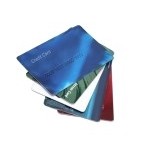 The general consensus these days is that carrying debt on multiple credit cards is a big no-no. In fact, having several credit cards tends to be a bad idea for most people most of the time, simply because we are raised with a consumer mentality that urges us to continue spending even if we are living beyond our means. Further, we are usually not well trained in how to budget, plan, save, or otherwise manage our finances, making it easy to get into debt but much harder to dig our way out. And while credit cards will certainly try to entice you with hooks like zero interest payments for the first year, extra discounts at the stores for which you hold particular cards, or reward programs that deliver discount or free travel with points, the truth is that all of them encourage you to spend your money before you’ve even earned it. So while it’s definitely a good idea to have a card on hand for emergency situations, a multitude of cards could get you into hot water rather quickly, especially if you’re not particularly good at controlling your urge to splurge.
The general consensus these days is that carrying debt on multiple credit cards is a big no-no. In fact, having several credit cards tends to be a bad idea for most people most of the time, simply because we are raised with a consumer mentality that urges us to continue spending even if we are living beyond our means. Further, we are usually not well trained in how to budget, plan, save, or otherwise manage our finances, making it easy to get into debt but much harder to dig our way out. And while credit cards will certainly try to entice you with hooks like zero interest payments for the first year, extra discounts at the stores for which you hold particular cards, or reward programs that deliver discount or free travel with points, the truth is that all of them encourage you to spend your money before you’ve even earned it. So while it’s definitely a good idea to have a card on hand for emergency situations, a multitude of cards could get you into hot water rather quickly, especially if you’re not particularly good at controlling your urge to splurge.
This brings us back to the question of whether or not to consolidate debt, and generally speaking, debt consolidation is an excellent idea for a number of reasons. For one thing, you’re bound to have certain credit cards that come with much lower interest rates. So transferring debt from a card with a higher rate will help you to save on your interest payments in the long run. As a bonus, once you have transferred all of the debt off the card with less attractive options you can cancel the account and cut up your card, alleviating the temptation to use it in the future. In addition to paying down your debt faster as a means of ditching the cards that charge greater interest, you might also want to plan to get rid of the cards with the highest limits. If you have a problem controlling your spending, a lower limit is bound to get you into less trouble.

